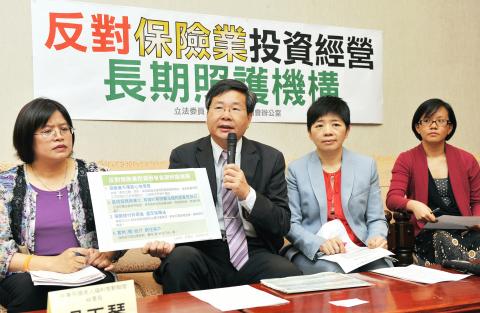Lawmakers and civic groups yesterday voiced their opposition to a government plan to allow insurance companies to run nursing homes, saying that it may commercialize the long-term care sector.
“Care of elderly people is not a commodity and should not be commercialized,” Taiwan Solidarity Union Legislator (TSU) Lin Shih-chia (林世嘉) told a press conference at the legislature in Taipei yesterday.
In a meeting of the Executive Yuan’s Promotion of Private Participation in Public Infrastructure Projects Commission last week, the proposed relaxing of regulations in the Senior Citizens Welfare Act (老人福利法) to allow for-profit enterprises to run long-term care (LTC) facilities received the support of the Executive Yuan.

Photo: Chien Jung-fong, Taipei Times
In addition to leading to unequal distribution of resources, privatizing services may result in exploitation of nursing staff since it is natural for private businesses to maximize profits, she said.
Lin was reacting to a proposal by the Financial Supervisory Commission (FSC) to allow insurance firms access to the LTC industry.
“Although the Ministry of Finance and the Department of Health both support the proposal, I am concerned that if insurance firms are allowed to operate in this sector, they would unfairly compete with government and non-governmental organizations,” TSU Legislator Hsu Chung-hsin (許忠信) said.
Hsu said that if insurance firms are granted access to the sector, new kinds of LTC insurance products would be on offer that are not “cashed in,” but are paid in the form of home or community-services benefits.
“However, the current Insurance Act (保險法) clearly states that the insured amount must be specified in an insurance contract,” Hsu said. “Allowing non-cash benefits without proper supporting measures and government supervision would affect the rights of the insured.”
Awakening Foundation policy director Tan Yu-jung (覃玉蓉) highlighted the dangers of allowing large private companies — as well as foreign firms — into the market.
“If we don’t have a healthy government-backed long-term care system in place, who is going to take over if large corporations decide to withdraw?” Tan asked.
“The government also plans to bring in foreign capital for care of the elderly, which includes Chinese capital — are we going to look to China for such care?” she asked.
Foundation for the Welfare of the Elderly secretary-general Wu Yu-chin (吳玉琴) also voiced concern over the proposals.
“The FSC cited Japan as an example of allowing private companies into the care sector. However, before implementing such a move, the Japanese government built a strong government-backed public insurance system,” Wu said.
“Also, the role of businesses in the Japanese care industry is limited to at-home care,” Wu added.
Wu said the groups have vowed to block any revisions to the Senior Citizens Welfare Act, which requires LTC service providers to be non-profit organizations.

Taiwan is stepping up plans to create self-sufficient supply chains for combat drones and increase foreign orders from the US to counter China’s numerical superiority, a defense official said on Saturday. Commenting on condition of anonymity, the official said the nation’s armed forces are in agreement with US Admiral Samuel Paparo’s assessment that Taiwan’s military must be prepared to turn the nation’s waters into a “hellscape” for the Chinese People’s Liberation Army (PLA). Paparo, the commander of the US Indo-Pacific Command, reiterated the concept during a Congressional hearing in Washington on Wednesday. He first coined the term in a security conference last

Prosecutors today declined to say who was questioned regarding alleged forgery on petitions to recall Democratic Progressive Party (DPP) legislators, after Chinese-language media earlier reported that members of the Chinese Nationalist Party (KMT) Youth League were brought in for questioning. The Ministry of Justice Investigation Bureau confirmed that two people had been questioned, but did not disclose any further information about the ongoing investigation. KMT Youth League members Lee Hsiao-liang (李孝亮) and Liu Szu-yin (劉思吟) — who are leading the effort to recall DPP caucus chief executive Rosalia Wu (吳思瑤) and Legislator Wu Pei-yi (吳沛憶) — both posted on Facebook saying: “I

Sung Chien-liang (宋建樑), who led efforts to recall Democratic Progressive Party (DPP) Legislator Lee Kun-cheng (李坤城), was released on bail of NT$80,000 today amid outcry over his decision to wear a Nazi armband to questioning the night before. Sung arrived at the New Taipei District Prosecutors’ Office for questioning in a recall petition forgery case last night wearing a red armband bearing a swastika, carrying a copy of Adolf Hitler’s Mein Kampf and giving a Nazi salute. Sung left the building at 1:15am without the armband and covering the book with his coat. Lee said today that this is a serious

The Ministry of Economic Affairs has fined Taobao NT$1.2 million (US$36,912) for advertisements that exceed its approved business scope, requiring the Chinese e-commerce platform to make corrections in the first half of this year or its license may be revoked. Lawmakers have called for stricter enforcement of Chinese e-commerce platforms and measures to prevent China from laundering its goods through Taiwan in response to US President Donald Trump’s heavy tariffs on China. The Legislative Yuan’s Finance Committee met today to discuss policies to prevent China from dumping goods in Taiwan, inviting government agencies to report. Democratic Progressive Party Legislator Kuo Kuo-wen (郭國文) said